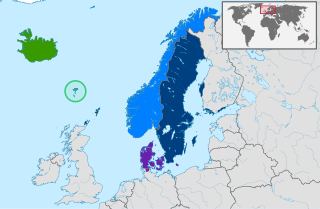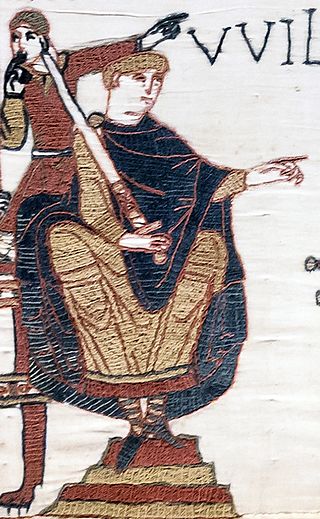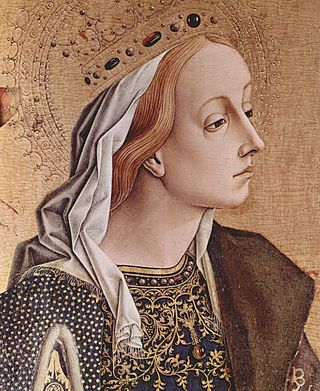
The North Germanic languages make up one of the three branches of the Germanic languages—a sub-family of the Indo-European languages—along with the West Germanic languages and the extinct East Germanic languages. The language group is also referred to as the Nordic languages, a direct translation of the most common term used among Danish, Faroese, Icelandic, Norwegian, and Swedish scholars and people.

The letter Å represents various sounds in several languages. It is a separate letter in Danish, Swedish, Norwegian, Finnish, North Frisian, Low Saxon, Transylvanian Saxon, Walloon, Chamorro, Lule Sami, Pite Sami, Skolt Sami, Southern Sami, Ume Sami, Pamirian languages, and Greenlandic alphabets. Additionally, it is part of the alphabets used for some Alemannic and Austro-Bavarian dialects of German.

William is a masculine given name of Germanic origin. It became very popular in the English language after the Norman conquest of England in 1066, and remained so throughout the Middle Ages and into the modern era. It is sometimes abbreviated "Wm." Shortened familiar versions in English include Will, Wills, Willy, Willie, Liam, Bill, and Billy. A common Irish form is Liam. Scottish diminutives include Wull, Willie or Wullie. Female forms are Willa, Willemina, Wilma and Wilhelmina.

Danish language exonyms for non-Danish speaking locations exist, primarily in Europe, but many of these are no longer commonly used, with a few notable exceptions. Rom (Rome), Lissabon, Sankt Petersborg and Prag (Prague) are still compulsory, while e.g. Venedig is more common than Venezia (Venice). In the decades following World War II, there has been a strong tendency towards replacing Danish exonyms with the native equivalent used in the foreign country itself. Possibly this is because many of these Danish forms were imported from German.
Ivar is a Scandinavian masculine given name. Another variant of the name is Iver, which is more common in Norway. The Old Norse name has several possible etymologies. In North Germanic phonology, several of the elements common to Germanic names became homophonous. The first element Ívarr may contain yr "yew" and -arr, but it may have become partly conflated with Ingvar, and possibly Joar. The second element -arr may alternatively also be from geir "spear" or it may be var "protector". The name was adopted into English as Ivor, into Gaelic as Ìomhar, into Estonian as Aivar or Aivo and into Latvian as Ivars.
Agustina is a given name, a feminine version of Augustine. It is a name popular in Argentina, Indonesia, and Uruguay. It may refer to:

Katherine, also spelled Catherine and other variations, is a feminine given name. The name and its variants are popular in countries where large Christian populations exist, because of its associations with one of the earliest Christian saints, Catherine of Alexandria.

A Danish passport is an identity document issued to citizens of the Kingdom of Denmark to facilitate international travel. Besides serving as proof of Danish citizenship, they facilitate the process of securing assistance from Danish consular officials abroad.
August is both a given name and surname developed from the Latin, Augustus. Derived from the Latin word augere, meaning "to increase", Augustus had the meaning "esteemed" or "venerable" and was a title given to Roman emperors.
Other language forms for the name John:

The Tall Ships Races are races for sail training "tall ships". The races are designed to encourage international friendship and training for young people in the art of sailing. The races are held annually in European waters and consists of two racing legs of several hundred nautical miles, and a "cruise in company" between the legs. Over one half of the crew of each ship participating in the races must consist of young people.
Antonia, Antónia, Antônia, or Antonía is a feminine given name and a surname. It is of Roman origin, used as the name of women of the Antonius family. Its meaning is "priceless", "praiseworthy" and "beautiful". Antonia is a Danish, Dutch, English, Faroese, Finnish, German, Italian, Norwegian, Polish, Romanian, Spanish, and Swedish name used in the United States, most of Canada, the Latin American states, Australia, New Zealand, Papua New Guinea, Indonesia, Philippines, Peninsular Malaysia, Singapore, India, Pakistan, Spain, Italy, Austria, Germany, Belgium, Netherlands, Poland, Romania, Bulgaria, Moldova, part of Serbia, Nordic countries, Greenland, Estonia, Republic of Karelia, South Africa, Namibia, Botswana, Zimbabwe, Zambia, Malawi, Tanzania, Uganda, Kenya, South Sudan, Sudan, and Ethiopia.
The Nordic diaspora may refer to:
Ranulph is a masculine given name of Norman origin.
Scandinavian Braille is a braille alphabet used, with differences in orthography and punctuation, for the languages of the mainland Nordic countries: Danish, Norwegian, Swedish, and Finnish. In a generally reduced form it is used for Greenlandic.
Augustin is a name, a variant of Augustine used in several languages, and may refer to:
Lilja is an Icelandic, Swedish, and Faroese name, the equivalent of the English Lily. It is in regular use in Iceland, Finland, Sweden, Denmark, Norway, and the Faroe Islands. It is also a Finnish and Swedish surname with the same meaning. Liljá is a Sámi spelling of the name.
Miss Europe 1981 was the 41st edition of the Miss Europe pageant and the 30th edition under the Mondial Events Organization. It was held in Birmingham, England, United Kingdom on 9 June 1981. Anne Mette Larsen of Denmark, was crowned Miss Europe 1981 by out going titleholder Karin Zorn of Austria.







